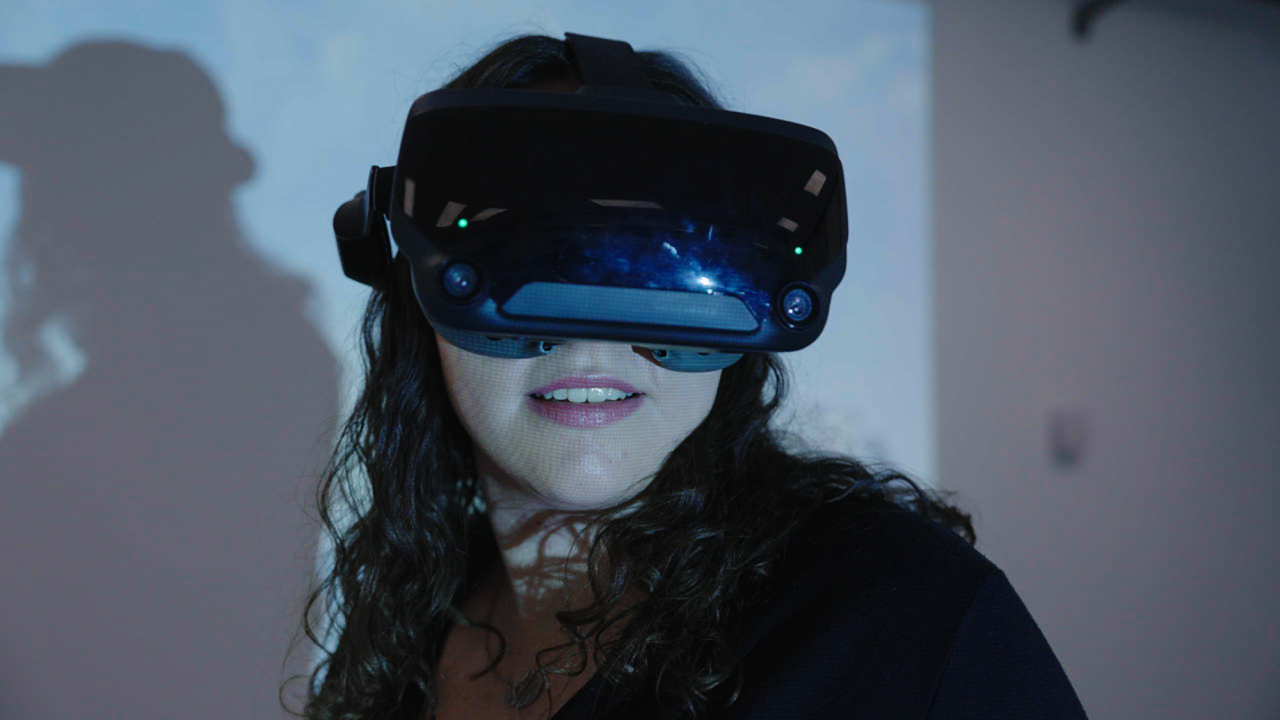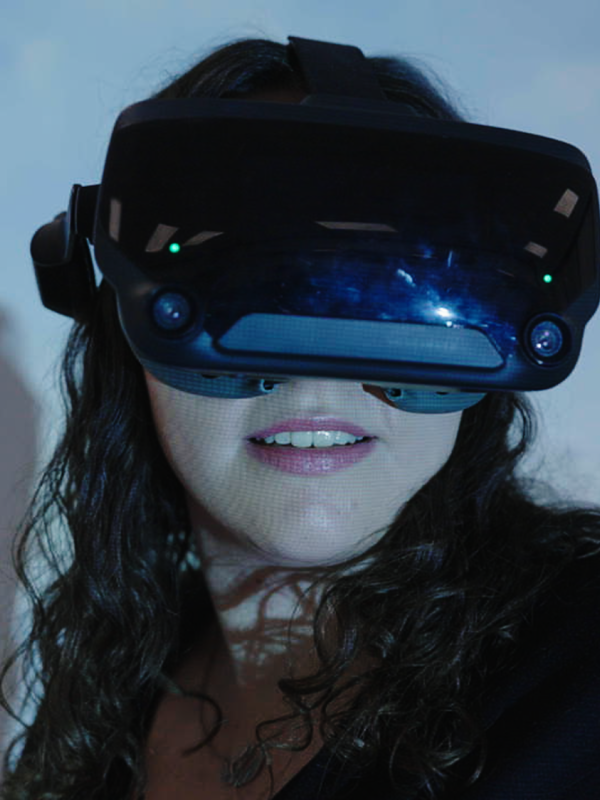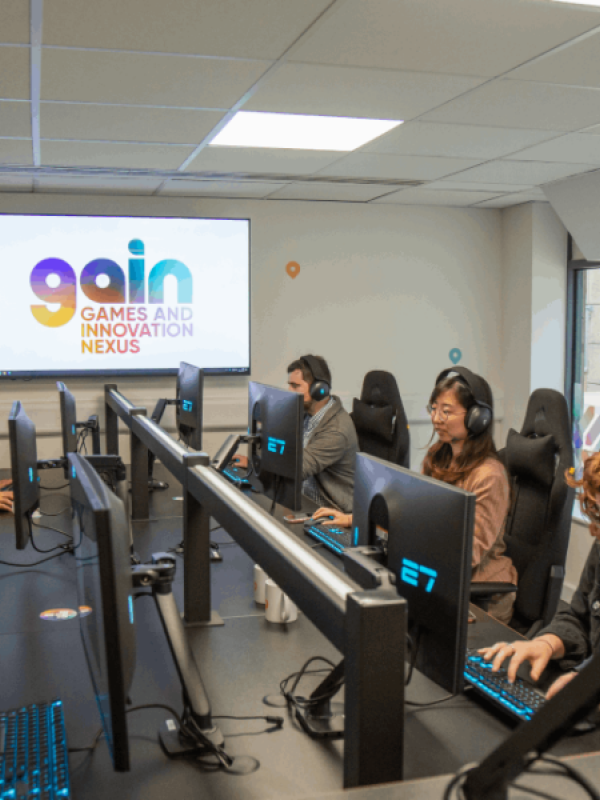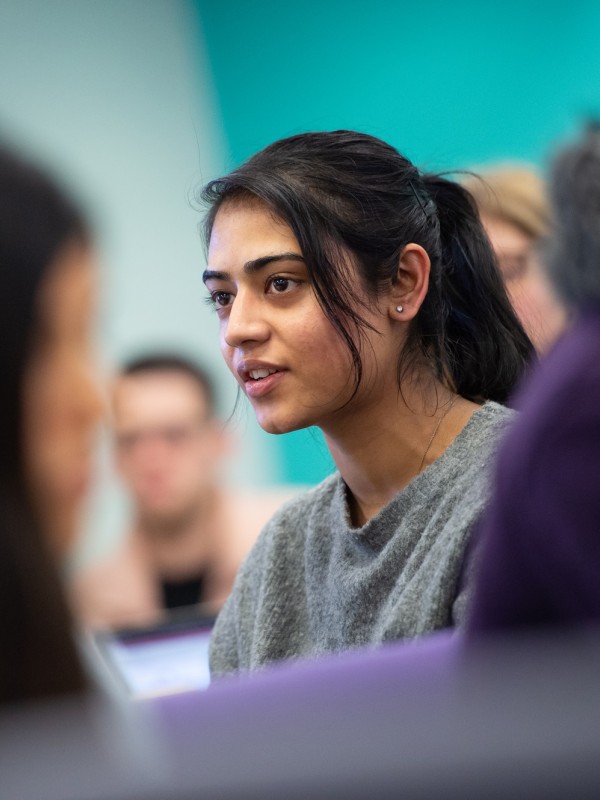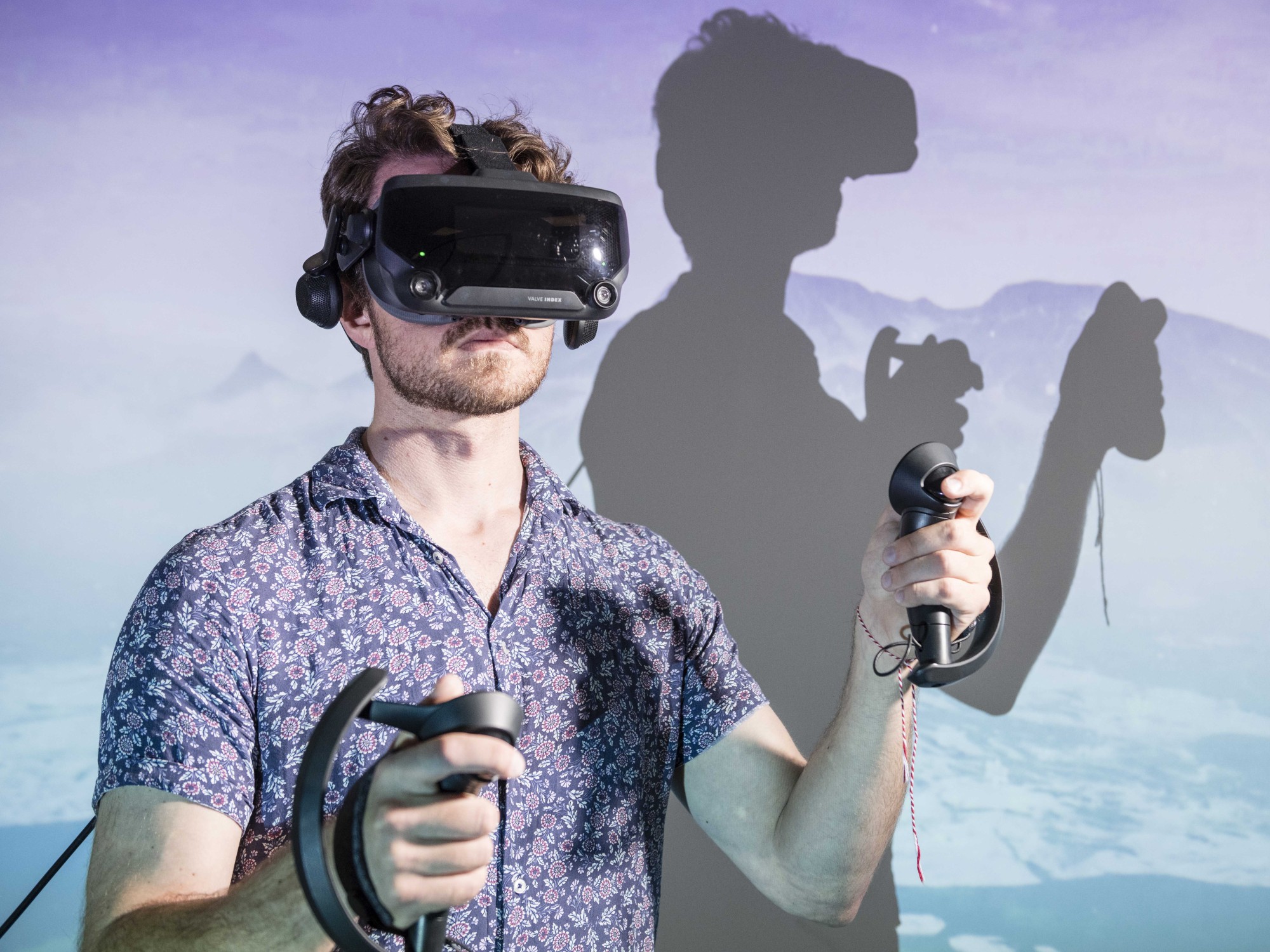
- Psychology in Game Design and Digital Innovation
MSc — 2026 entry Psychology in Game Design and Digital Innovation
Study on a course that puts you at the forefront of an emerging field in the globally expanding gaming sector, exploring how psychological principles and research can be applied to game design.
4,138+ people have created a bespoke digital prospectus
Why choose
this course?
- Learn about how the rapid growth of technology and digital innovation impacts human behaviour and examine the intersection between psychology and our digital experience.
- Tailor the course to your interests with our wide range of optional modules, including delving deeper into aspects of psychology, exploring extended reality and learning how to write creatively for games.
- Take advantage of Surrey's location in the heart of Guildford, known as the 'Hollywood of Video Games', and attend the Guildford Games Festival to connect with games designers.
- Learn from lecturers who are active researchers in key psychological areas, such as cognitive, developmental and social psychology.
- Study a multidisciplinary curriculum, with contributions from a range of schools, departments and research centres at Surrey, including our Centre for Vision, Speech and Signal Processing, Surrey Institute for People-Centred Artificial Intelligence and Digital World Research Centre.
Statistics
1st in the UK
Psychology is ranked 1st in the UK for overall student satisfaction in the Postgraduate Taught Experience Survey 2025
97%
Of our psychology masters graduates are in employment or further study within 15 months of graduating (Graduate Outcomes 2025, HESA)
What you will study
On this course, you will receive comprehensive training on the psychological theories that cover cognitive, emotional, social and ethical aspects of game design and digital technology. You will learn how to develop gaming and digital experiences that are engaging, immersive and beneficial.
You will explore topics such as motivation, emotion, attention, learning and social behaviour and learn about game design principles such as gameplay mechanics, level design and narrative structure as well as the ethical considerations involved. You will develop the theoretical and methodological expertise to conduct psychological research in various phases of game and digital innovation design.
Throughout the course, you will also have the opportunity to work on projects that apply the knowledge and skills you have learnt to real-world game development challenges. This may include designing and developing your own games, conducting user research studies or analysing player data.
Research
You’ll have the opportunity to learn from our research groups, by participating in discussions about research topics, findings and publications, and benefiting from our links with renowned research institutions across the world. We also have a host of external speakers who visit us and present their work, and a collection of seminars and workshops which allow you to network with like-minded individuals.
You'll also be studying in a department where researchers have published on the positive impact of games on people's lives, including:
- The power of puzzles and LEGO to improve spatial reasoning in children, a fundamental skill for STEM subjects
- Acquiring the skill of perfect pitch in adulthood
- Trialling the use of animated virtual reality to reduce mental health stigma.
Games and Innovation Nexus (GAIN)
The University of Surrey is part of the Games and Innovation Nexus (GAIN) project. This research partnership connects University researchers with games companies to help to tackle challenges facing the games industry.
Facilities
Our psychology facilities will give you access to the latest equipment, including a six-room virtual reality suite to simulate real-life scenarios and two observation labs. You’ll also have access to an extensive library of psychometric and clinical tests, 20 bookable project rooms, a breakout space, equipment lockers and a computer lab.
The structure of our programmes follows clear educational aims that are tailored to each programme. These are all outlined in the programme specifications which include further details such as the learning outcomes:
Modules
Modules listed are indicative, reflecting the information available at the time of publication. Modules are subject to teaching availability, student demand and/or class size caps.
The University operates a credit framework for all taught programmes based on a 15-credit tariff, meaning all modules are comprised of multiples of 15 credits.
Course options
Year 1
Semester 1
Compulsory
Design of games and digital experiences benefit from the study of psychology due to the need to understand the mental functioning of the users. Gamification, in turn, also facilitates psychological research and intervention, as in assessments, education, behaviour change, etc. This module is about developing the knowledge and skills to adopt psychological principles and findings in the design of games and digital experience, as well as to apply gamification techniques to render psychological research and intervention more engaging and effective. We will review the cognitive, emotional, motivational, and social aspects of the human mind relevant to game mechanics, and investigate why certain games are more engaging than others. A particular focus will be made on how gamification facilitates psychology research and applications via better personalization, higher efficiency, and more enjoyment.
View full module detailsThis module explores how gameful design, leveraging elements such as challenge, feedback, narrative, and progression, can motivate and sustain engagement across non-game contexts, including education, research, therapy, fitness, and marketing. Students will learn to design, critique, and prototype systems that foster meaningful engagement by applying psychological theories of motivation and user-centred design.
View full module detailsOptional
This module equips students with the skills to design and undertake academic research in psychology, in preparation for developing their own dissertations. The module will cover key aspects of research design, including literature review, forming hypotheses, ethical conduct, and study design and methods, both quantitative and qualitative. Students will propose a study design in a group presentation; implement the study via small-scale data collection and analysis; and present and discuss the findings in an individual research report.
View full module detailsThis level 7 module introduces students to the principles and practices of qualitative research. It provides students with the requisite knowledge and skills to undertake, critically evaluate, and write up a small qualitative research project. Students will be introduced to a range of methods of qualitative data collection and analytic procedures and gain insight into the application of qualitative methods through practical group work. Students will be encouraged to participate actively and think critically about the principles, methods and procedures that we will discuss. In terms of the students’ learning journey, the module will equip them to undertake a qualitative project for their dissertation should they choose to do so. The module is designed to introduce students who have little or no experience of qualitative research to the principles and practices of this approach. It also meets the needs of those who already have some experience in this area, by enabling these students to build on, refine, and extend their existing knowledge through the provision of advanced material on Surrey Learn in the form of captured content relating to additional methods of analysing qualitative data. These students will also be encouraged to extend their practical knowledge and experience by selecting an analytic procedure that they have not previously used to analyse the data for their group project. Through conducting a small group project students will be given the opportunity to gain experience in conducting qualitative research and in applying the principles and practices covered in the lectures. The module provides students with an opportunity to learn about the interpersonal skills required to conduct a good research interview and those needed to successfully conduct and manage a group project. Students are also encouraged to develop their personal reflective skills to enhance their understanding of how their own cultural background, social identity, gender, previous experiences, and prior knowledge can shape data collection and analysis, as well as individual sense-making.
View full module detailsSocial Psychology investigates how our cognitions (thought processes), affective states (feelings and emotions) and behaviours are related to the social world. This module will introduce you to key concepts, theories, methods, and findings in Social Psychology. The course covers core BPS curriculum in social psychology. Through successful completion of this module, students will develop an understanding of Social Psychological topics including: attitudes and behaviours change, social influence, emotions, prejudice and discrimination of minority groups.
View full module detailsThis module aims to introduce biological psychology and provide the foundation for understanding the biological bases of psychological processes and disorders. In this module we will focus on the organization and function of the human nervous system, from the cells that form the brain and their fundamental functions, the processes by which those communicate, and the systems that allow us to sense and move. We will cover relevant topics in the history of neuroscience and ethics, neuroanatomy, psychopharmacology, neurodevelopment, sensory systems and motor control and the biological causes of brain disorders. Workshops on research methods will provide you with an understanding and hands-on experience with the tools available to measure and modulate brain function and an opportunity to develop teamwork skills. Tutorial sessions will aid your understanding of the theory and allow you to consolidate knowledge by engaging with quizzes and activities.
View full module detailsThis module will provide students with knowledge, skills, and practical experience of advanced research methods and design. It emphasises a critical and creative approach to evaluating research methods and design and applying them to scientific questions. It will support the development of novel, theoretically significant, rigorous, and impactful research proposals.
View full module detailsExtended reality (XR) technologies are increasingly adopted to create more immersive and interactive experience in games, training and education, healthcare and psychology research. This module will provide students with an understanding of these technologies and their practical applications to address human needs. Students will develop hands-on experience in creating XR-enhanced experiences. No extensive coding experience is required.
View full module detailsSemester 2
Compulsory
This course is a lab-based/practical course intended to get students to use the freely available Jamovi software for data analysis and to understand what they are doing when they use it.
View full module detailsThe design and evaluation of games and digital experiences are continually influenced by technological advancements. This module explores the integration of cutting-edge technologies, such as neural measurements and robotics, within gaming contexts. Additionally, it covers the methodologies of game user research to assess the usability and experiential aspects of games and digital experience.
View full module detailsOptional
Gaming has existed as a mode of play and expression since the earliest times of human existence. In the latter part of the 20th and into the first two decades of the 21st Century (the period we will focus on with this module), there has been a vast expansion of the forms, modes and technologies employed in gaming and game play. Out of wargaming and board gaming practices (and often the interfaces of these) in the post-World War II era, increasingly complex and sophisticated character and narrative focussed Role-Playing Games (RPGs) developed as well as other narrative forms that connect gaming with interactive textuality, such as gamebooks, Collectable Card Games, online interactive fiction, video games and multi-player online gaming platforms. There has been, in the early 21st century, additionally, a large increase in the number of board games being produced and played, while wargaming also remains an active and vibrant aspect of gaming culture. An aspect of gaming that has sometimes fallen short, in 'quality' terms, though, is the writing that underpins both the rules systems and the 'story' component of games (background, character, description. narrative, dialogue, terminology, etc.) This is perhaps unsurprising as games have been primarily written by gamers rather than professional writers; many of these, of course, go on to develop their writing skills and become accomplished writers in their own right. More and more, though, creative writers are specifically incorporated into the game design and realisation processes (for both analogue and virtual gaming environments) to improve the quality of the gaming experience. In this module students will receive an overview of the gaming field and examine aspects of this that specifically pertain to writing for games. What approaches work well for games and gaming modes? How are these different from writing for and in other forms and media? What writing skills are particularly useful? Do we have the freedom to write outside of limiting industry constraints and models? What are the new forms of writing practice that are emerging in relation to games and gaming? We will also be interested in analysing games and gaming critically as cultural objects, and situating them within the broader context of contemporary cultural and literary theory. This is not a module that will teach students how to code and/or produce and design video games (or, indeed commercial analogue games). We will touch on aspects of game design, game production, gaming studies, critical digital studies, etc., but the focus for this module will be on writing creatively for games: writing gaming. Expert guest speakers from the gaming and independent gaming industries will be included in the teaching provision for this module. If students have specific coding, visual art or musical/sound art skills that they would like to bring to their exercises and assignments, they can certainly draw on these skills, but if they don't, that is completely fine - none of these are required for this module. In each seminar we will first spend some time discussing the set texts and the techniques and standpoints employed by writers and other artists, before moving on to the workshop part of the session where students will produce work in accordance with the task set for that week, within and outside of the classroom. We will read and discuss a selection of pieces at the end of each class. This process will help students grow in confidence, both in presentational terms and in terms of delivering and receiving feedback on their work, in a safe and supportive setting. In addition, each week there will be a scheduled 2-hour gaming session where students will gather to explore individual and collaborative gaming in practice. Different approaches to gaming will be proposed each week, or students can opt to work during this time on longer gaming experiences and projects. At the end of the semester students will produce a creative portfolio of gaming writing, alongside a critical commentary reflecting on the creative work produced and using theories, concepts and practices studied on the module, OR an academic critical essay examining some aspect of writing for games OR a Game Demo alongside a critical commentary reflecting on the demo produced and using theories, concepts and practices studied on the module. Possible submissions for the creative portfolio include online interactive fiction (e.g. Twine, Squiffy), a gamebook text, a tabletop game text (board game, card game, wargame, Role-Playing Game), a game demo, a game setting, a game system, Game Design Documentation (GDD) for a proposed game, a 'creative essay', gaming portfolio as creative essay, a zine, a website for a game, etc. This module connects to other contemporary literature modules on the programme where the emphasis is on 20th and 21st Century approaches to creating and examining literatures and our cultural responses to them. As a hybrid creative writing and English literature module, it also makes up part of the creative writing pathway in the degree, connecting to a wide variety of creative writing modules offered as part of the programme.
View full module detailsAdvances in digital technology are relevant to behaviour change research and practice in three ways: helping behavioural scientists to develop a more sophisticated understanding of human behaviour, enhancing the design and delivery of behaviour change interventions, and shaping everyday behaviours in its own right. This module seeks to explore the contribution that digital tech has made – and continues to make – to understanding and changing behaviour. Students will be introduced to cutting-edge research and practice across a range of tech domains, such as machine learning, Big Data, digital addiction, and digital behaviour change applications. Students will be introduced to a range of disciplinary perspectives, theories and concepts relating to digital technology, and will develop the skills and knowledge required to apply these to behaviour change research and intervention contexts for maximum effectiveness.
View full module detailsThis module will provide an introduction to the major topics and issues within cognitive psychology. This will be done through a series of lectures and research based workshops, which will provide student with an opportunity to integrate their developing knowledge of cognitive psychology with practical skills relating to cognitive research methods.
View full module detailsThis module teaches you the main theories and empirical evidence in developmental psychology. It also enables you to demonstrate your prior knowledge of Jamovi and statistical techniques gained in first semester and supports you in further modules that require written research reports, such as your dissertation. In this module we will critically evaluate empirical research and theoretical knowledge. One way we will engage in critical evaluation is to examine whether previous work is cross-culturally valid.You will develop your written and numerical communication skills by performing data analysis, writing up a research report, and evaluating a topic in-depth for the exam.
View full module detailsSemester 1 & 2
Core
It is a requirement of the University that taught postgraduate programmes include a dissertation and/or major project module. For this module, students will conduct their own piece of empirical research in an area relevant to their Masters course under the supervision of a member of the academic staff. For the assessment, students will write either a qualitative or mixed-method research report of a comparable length to a published single-study journal article.Overall student workload: 600 hoursThis includes 12 hours of tutor supervision. These hours will include development of theoretical framework, aims and hypotheses, recruiting samples, fieldwork and liaison with key personnel as appropriate, data recording and analysis, interpretation and writing up. Specific times for these subsections cannot be given as they vary from project to project.
View full module detailsOptional modules for Year 1 (full-time) - FHEQ Levels 6 and 7
Full-time students are required to complete, in addition to the year-long Dissertation, four modules per semester: Two compulsory modules and two optional modules in each semester.
Students MUST select PSYM130 or PSYM147 as one of their optional modules but cannot take both (Semester 1).
Year 1
Semester 1
Compulsory
Design of games and digital experiences benefit from the study of psychology due to the need to understand the mental functioning of the users. Gamification, in turn, also facilitates psychological research and intervention, as in assessments, education, behaviour change, etc. This module is about developing the knowledge and skills to adopt psychological principles and findings in the design of games and digital experience, as well as to apply gamification techniques to render psychological research and intervention more engaging and effective. We will review the cognitive, emotional, motivational, and social aspects of the human mind relevant to game mechanics, and investigate why certain games are more engaging than others. A particular focus will be made on how gamification facilitates psychology research and applications via better personalization, higher efficiency, and more enjoyment.
View full module detailsOptional
This module equips students with the skills to design and undertake academic research in psychology, in preparation for developing their own dissertations. The module will cover key aspects of research design, including literature review, forming hypotheses, ethical conduct, and study design and methods, both quantitative and qualitative. Students will propose a study design in a group presentation; implement the study via small-scale data collection and analysis; and present and discuss the findings in an individual research report.
View full module detailsThis module will provide students with knowledge, skills, and practical experience of advanced research methods and design. It emphasises a critical and creative approach to evaluating research methods and design and applying them to scientific questions. It will support the development of novel, theoretically significant, rigorous, and impactful research proposals.
View full module detailsSemester 2
Compulsory
This course is a lab-based/practical course intended to get students to use the freely available Jamovi software for data analysis and to understand what they are doing when they use it.
View full module detailsThe design and evaluation of games and digital experiences are continually influenced by technological advancements. This module explores the integration of cutting-edge technologies, such as neural measurements and robotics, within gaming contexts. Additionally, it covers the methodologies of game user research to assess the usability and experiential aspects of games and digital experience.
View full module detailsOptional modules for Year 1 (part-time) - FHEQ Levels 6 and 7
Part-time students are required to complete two modules per semester from the available modules, in addition to the year-long Dissertation in the second year.
Students MUST select PSYM130 or PSYM147 as one of their optional modules but cannot take both (Semester 1).
Year 2
Semester 1
Compulsory
This module explores how gameful design, leveraging elements such as challenge, feedback, narrative, and progression, can motivate and sustain engagement across non-game contexts, including education, research, therapy, fitness, and marketing. Students will learn to design, critique, and prototype systems that foster meaningful engagement by applying psychological theories of motivation and user-centred design.
View full module detailsOptional
This level 7 module introduces students to the principles and practices of qualitative research. It provides students with the requisite knowledge and skills to undertake, critically evaluate, and write up a small qualitative research project. Students will be introduced to a range of methods of qualitative data collection and analytic procedures and gain insight into the application of qualitative methods through practical group work. Students will be encouraged to participate actively and think critically about the principles, methods and procedures that we will discuss. In terms of the students’ learning journey, the module will equip them to undertake a qualitative project for their dissertation should they choose to do so. The module is designed to introduce students who have little or no experience of qualitative research to the principles and practices of this approach. It also meets the needs of those who already have some experience in this area, by enabling these students to build on, refine, and extend their existing knowledge through the provision of advanced material on Surrey Learn in the form of captured content relating to additional methods of analysing qualitative data. These students will also be encouraged to extend their practical knowledge and experience by selecting an analytic procedure that they have not previously used to analyse the data for their group project. Through conducting a small group project students will be given the opportunity to gain experience in conducting qualitative research and in applying the principles and practices covered in the lectures. The module provides students with an opportunity to learn about the interpersonal skills required to conduct a good research interview and those needed to successfully conduct and manage a group project. Students are also encouraged to develop their personal reflective skills to enhance their understanding of how their own cultural background, social identity, gender, previous experiences, and prior knowledge can shape data collection and analysis, as well as individual sense-making.
View full module detailsSocial Psychology investigates how our cognitions (thought processes), affective states (feelings and emotions) and behaviours are related to the social world. This module will introduce you to key concepts, theories, methods, and findings in Social Psychology. The course covers core BPS curriculum in social psychology. Through successful completion of this module, students will develop an understanding of Social Psychological topics including: attitudes and behaviours change, social influence, emotions, prejudice and discrimination of minority groups.
View full module detailsThis module aims to introduce biological psychology and provide the foundation for understanding the biological bases of psychological processes and disorders. In this module we will focus on the organization and function of the human nervous system, from the cells that form the brain and their fundamental functions, the processes by which those communicate, and the systems that allow us to sense and move. We will cover relevant topics in the history of neuroscience and ethics, neuroanatomy, psychopharmacology, neurodevelopment, sensory systems and motor control and the biological causes of brain disorders. Workshops on research methods will provide you with an understanding and hands-on experience with the tools available to measure and modulate brain function and an opportunity to develop teamwork skills. Tutorial sessions will aid your understanding of the theory and allow you to consolidate knowledge by engaging with quizzes and activities.
View full module detailsExtended reality (XR) technologies are increasingly adopted to create more immersive and interactive experience in games, training and education, healthcare and psychology research. This module will provide students with an understanding of these technologies and their practical applications to address human needs. Students will develop hands-on experience in creating XR-enhanced experiences. No extensive coding experience is required.
View full module detailsSemester 2
Optional
Gaming has existed as a mode of play and expression since the earliest times of human existence. In the latter part of the 20th and into the first two decades of the 21st Century (the period we will focus on with this module), there has been a vast expansion of the forms, modes and technologies employed in gaming and game play. Out of wargaming and board gaming practices (and often the interfaces of these) in the post-World War II era, increasingly complex and sophisticated character and narrative focussed Role-Playing Games (RPGs) developed as well as other narrative forms that connect gaming with interactive textuality, such as gamebooks, Collectable Card Games, online interactive fiction, video games and multi-player online gaming platforms. There has been, in the early 21st century, additionally, a large increase in the number of board games being produced and played, while wargaming also remains an active and vibrant aspect of gaming culture. An aspect of gaming that has sometimes fallen short, in 'quality' terms, though, is the writing that underpins both the rules systems and the 'story' component of games (background, character, description. narrative, dialogue, terminology, etc.) This is perhaps unsurprising as games have been primarily written by gamers rather than professional writers; many of these, of course, go on to develop their writing skills and become accomplished writers in their own right. More and more, though, creative writers are specifically incorporated into the game design and realisation processes (for both analogue and virtual gaming environments) to improve the quality of the gaming experience. In this module students will receive an overview of the gaming field and examine aspects of this that specifically pertain to writing for games. What approaches work well for games and gaming modes? How are these different from writing for and in other forms and media? What writing skills are particularly useful? Do we have the freedom to write outside of limiting industry constraints and models? What are the new forms of writing practice that are emerging in relation to games and gaming? We will also be interested in analysing games and gaming critically as cultural objects, and situating them within the broader context of contemporary cultural and literary theory. This is not a module that will teach students how to code and/or produce and design video games (or, indeed commercial analogue games). We will touch on aspects of game design, game production, gaming studies, critical digital studies, etc., but the focus for this module will be on writing creatively for games: writing gaming. Expert guest speakers from the gaming and independent gaming industries will be included in the teaching provision for this module. If students have specific coding, visual art or musical/sound art skills that they would like to bring to their exercises and assignments, they can certainly draw on these skills, but if they don't, that is completely fine - none of these are required for this module. In each seminar we will first spend some time discussing the set texts and the techniques and standpoints employed by writers and other artists, before moving on to the workshop part of the session where students will produce work in accordance with the task set for that week, within and outside of the classroom. We will read and discuss a selection of pieces at the end of each class. This process will help students grow in confidence, both in presentational terms and in terms of delivering and receiving feedback on their work, in a safe and supportive setting. In addition, each week there will be a scheduled 2-hour gaming session where students will gather to explore individual and collaborative gaming in practice. Different approaches to gaming will be proposed each week, or students can opt to work during this time on longer gaming experiences and projects. At the end of the semester students will produce a creative portfolio of gaming writing, alongside a critical commentary reflecting on the creative work produced and using theories, concepts and practices studied on the module, OR an academic critical essay examining some aspect of writing for games OR a Game Demo alongside a critical commentary reflecting on the demo produced and using theories, concepts and practices studied on the module. Possible submissions for the creative portfolio include online interactive fiction (e.g. Twine, Squiffy), a gamebook text, a tabletop game text (board game, card game, wargame, Role-Playing Game), a game demo, a game setting, a game system, Game Design Documentation (GDD) for a proposed game, a 'creative essay', gaming portfolio as creative essay, a zine, a website for a game, etc. This module connects to other contemporary literature modules on the programme where the emphasis is on 20th and 21st Century approaches to creating and examining literatures and our cultural responses to them. As a hybrid creative writing and English literature module, it also makes up part of the creative writing pathway in the degree, connecting to a wide variety of creative writing modules offered as part of the programme.
View full module detailsAdvances in digital technology are relevant to behaviour change research and practice in three ways: helping behavioural scientists to develop a more sophisticated understanding of human behaviour, enhancing the design and delivery of behaviour change interventions, and shaping everyday behaviours in its own right. This module seeks to explore the contribution that digital tech has made – and continues to make – to understanding and changing behaviour. Students will be introduced to cutting-edge research and practice across a range of tech domains, such as machine learning, Big Data, digital addiction, and digital behaviour change applications. Students will be introduced to a range of disciplinary perspectives, theories and concepts relating to digital technology, and will develop the skills and knowledge required to apply these to behaviour change research and intervention contexts for maximum effectiveness.
View full module detailsThis module will provide an introduction to the major topics and issues within cognitive psychology. This will be done through a series of lectures and research based workshops, which will provide student with an opportunity to integrate their developing knowledge of cognitive psychology with practical skills relating to cognitive research methods.
View full module detailsThis module teaches you the main theories and empirical evidence in developmental psychology. It also enables you to demonstrate your prior knowledge of Jamovi and statistical techniques gained in first semester and supports you in further modules that require written research reports, such as your dissertation. In this module we will critically evaluate empirical research and theoretical knowledge. One way we will engage in critical evaluation is to examine whether previous work is cross-culturally valid.You will develop your written and numerical communication skills by performing data analysis, writing up a research report, and evaluating a topic in-depth for the exam.
View full module detailsSemester 1 & 2
Core
It is a requirement of the University that taught postgraduate programmes include a dissertation and/or major project module. For this module, students will conduct their own piece of empirical research in an area relevant to their Masters course under the supervision of a member of the academic staff. For the assessment, students will write either a qualitative or mixed-method research report of a comparable length to a published single-study journal article.Overall student workload: 600 hoursThis includes 12 hours of tutor supervision. These hours will include development of theoretical framework, aims and hypotheses, recruiting samples, fieldwork and liaison with key personnel as appropriate, data recording and analysis, interpretation and writing up. Specific times for these subsections cannot be given as they vary from project to project.
View full module detailsOptional modules for Year 2 (part-time) - FHEQ Levels 6 and 7
Part-time students are required to complete two modules per semester from the available modules, in addition to the year-long Dissertation in the second year.
Students MUST select PSYM130 or PSYM147 as one of their optional modules but cannot take both (Semester 1).
Teaching and learning
Your teaching will be delivered through a combination of:
- Lectures
- Laboratory-based practicals
- One-to-one supervision
- Online learning
- Seminars
- Tutorials
- Workshops.
You’ll also be expected to carry out independent study, including coursework, essays, reading and research.
Assessment
We use a variety of methods to assess you, including design projects, critical reports, oral presentations, video pitches and group work.
Check individual module information to see full details at a module level.
General course information
Contact hours
Contact hours can vary across our modules. Full details of the contact hours for each module are available from the University of Surrey's module catalogue. See the modules section for more information.
Timetable
New students will receive their personalised timetable during Welcome Week. In later semesters, at least one week before the start of the semester.
Scheduled teaching can take place on any day of the week (Monday – Friday), with part-time classes normally scheduled for one or two days. Wednesday afternoons tend to be for sports and cultural activities.
View our code of practice for the scheduling of teaching and assessment (PDF) for more information.
Location
This course is based at Stag Hill campus. Stag Hill is the University's main campus and where the majority of our courses are taught.
We offer careers information, advice and guidance to all students whilst studying with us, which is extended to our alumni for three years after leaving the University.
The rapid growth of games and technology has created a strong demand for professionals with expertise in areas linked to psychology, game design and digital technology.
As a graduate of this course, you will possess skills and knowledge that can be applied in a variety of fields, including gaming, marketing, policymaking, education and cybersecurity.
Due to our location in Guildford, one of the largest gaming hubs in the UK, and our close proximity to London, you will have opportunities throughout the course to network and build industry contacts ready for when you graduate.
You may choose to join a game technology or development company, government agency, non-profit organisation or academic institution in a role such as game designer, user experience researcher, digital marketer, policy analyst or educator.
Alternatively, you may choose to complete a PhD, investigating an area of personal interest.
UK qualifications
An interest in human behaviour and game design with a minimum of a 2:2 UK honours degree in psychology, product development, art and design, communications and multimedia, game design, computer science, or a recognised international equivalent.
We may be able to take relevant work experience into consideration if you don't meet the typical requirements. If you have at least one year of relevant experience in a full-time graduate-level role (or a minimum of two years’ experience in a relevant graduate-level part-time role) please provide full details of your role and responsibilities in your personal statement and CV when you submit your application.
Applications with other degree subjects, or those without relevant GCSEs, may be considered by the faculty on a case-by-case basis.
English language requirements
IELTS Academic: 6.5 overall with 6.5 in each component.
These are the English language qualifications and levels that we can accept.
If you do not currently meet the level required for your programme, we offer intensive pre-sessional English language courses, designed to take you to the level of English ability and skill required for your studies here.
Recognition of prior learning
We recognise that many students enter their course with valuable knowledge and skills developed through a range of ways.
If this applies to you, the recognition of prior learning process may mean you can join a course without the formal entry requirements, or at a point appropriate to your previous learning and experience.
There are restrictions for some courses and fees may be payable for certain claims. Please contact the Admissions team with any queries.
Scholarships and bursaries
Discover what scholarships and bursaries are available to support your studies.
Fees per year
Explore UKCISA’s website for more information if you are unsure whether you are a UK or overseas student. View the list of fees for all postgraduate courses.
September 2026 - Full-time - 1 year
- UK
- £10,300
- Overseas
- £22,700
September 2026 - Part-time - 2 years
- UK
- £5,200
- Overseas
- £11,400
- These fees apply to the academic year 2026-27 only. Fees are reviewed annually, and tuition fees may increase for courses running over more than one year.
Payment schedule
- Students with Tuition Fee Loan: the Student Loans Company pay fees in line with their schedule (students on an unstructured self-paced part-time course are not eligible for a Tuition Fee Loan).
- Students without a Tuition Fee Loan: pay their fees either in full at the beginning of the programme or in two instalments as follows:
- 50% payable 10 days after the invoice date (expected to be October/November of each academic year)
- 50% in January of the same academic year.
- Students on part-time programmes where fees are paid on a modular basis: cannot pay fees by instalment.
- Sponsored students: must provide us with valid sponsorship information that covers the period of study.
The exact date(s) will be on invoices.
Additional costs
- General programme related costs such as study materials
- Potential costs involved in conducting independent learning remotely e.g. internet connection etc.
Funding
You may be able to borrow money to help pay your tuition fees and support you with your living costs. Find out more about postgraduate student finance.
Apply online
To apply online first select the course you'd like to apply for then log in.
Select your course
Choose the course option you wish to apply for.
Sign in
Create an account and sign into our application portal.
Please note that we may have to close applications before the stated deadline if we receive a high volume of suitable applications. We advise you to submit your application as soon as it is ready.
ApplyPlease note that we may have to close applications before the stated deadline if we receive a high volume of suitable applications. We advise you to submit your application as soon as it is ready.
ApplyAdmissions information
Once you apply, you can expect to hear back from us within 14 days. This might be with a decision on your application or with a request for further information.
Our code of practice for postgraduate taught admissions explains how the Admissions team considers applications and admits students. Read our postgraduate applicant guidance for more information on applying.
About the University of Surrey
Need more information?
Contact our Admissions team or talk to a current University of Surrey student online.
Terms and conditions
When you accept an offer to study at the University of Surrey, you are agreeing to follow our policies and procedures, student regulations, and terms and conditions.
We provide these terms and conditions at offer stage and are shown again at registration. You will be asked to accept these terms and conditions when you accept the offer made to you.
View our generic registration terms and conditions (PDF) for the 2025/26 academic year, as a guide on what to expect.
Disclaimer
This online prospectus has been published in advance of the academic year to which it applies.
Whilst we have done everything possible to ensure this information is accurate, some changes may happen between publishing and the start of the course.
It is important to check this website for any updates before you apply for a course with us. Read our full disclaimer.
